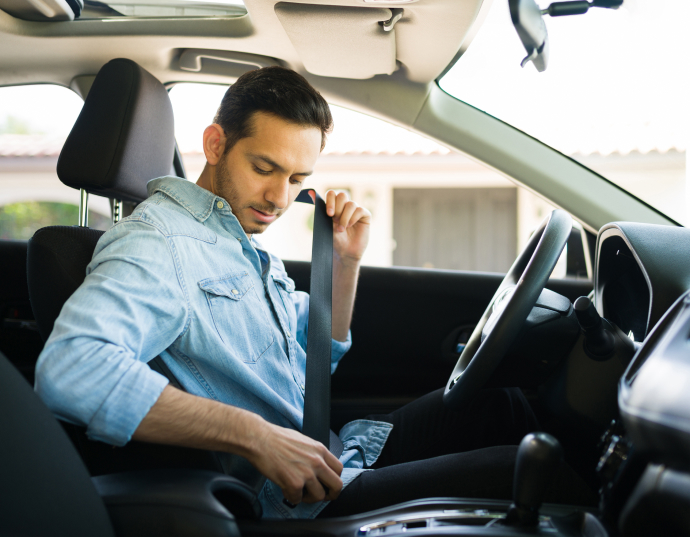
Car accidents happen every day, in Denver and across the nation. If you have been injured in a car accident that was someone else’s fault, a Denver car accident lawyer from The Wilhite Law Firm can help.
A December 2014 report from the National Highway Traffic Safety Administration* (NHTSA) indicated that in 2013 21,132 passenger vehicle occupants were killed and 2,046,000 were injured in traffic collisions on U.S. roadways. Passenger car and light truck occupants accounted for 65 percent of traffic fatalities that year.
There are many reasons for car accidents, but most are caused by some type of driver error. Whether you have been injured in an accident caused by a drunk driver, a distracted driver, a drowsy driver, or someone who simply failed to exercise safe driving behavior, your best course of action is to consult with an experienced Denver car wreck accident attorney.

Why Choose The Wilhite Law Firm?
Hiring The Wilhite Law Firm to handle your car accident case means putting your trust in a team that has passionately defended the rights of Coloradans since 1977. From our humble beginnings with two attorneys and a secretary, our Denver personal injury law firm now includes nearly 30 lawyers and over 90 dedicated staff members, all committed to providing top-notch representation. Our approach combines aggressive advocacy with a caring touch to make your journey to recovery as smooth as possible.
Communication is critical to the support we offer. Unlike other firms, where clients can feel left in the dark, we make sure to keep you in the loop. This approach fosters a trusting relationship between us and our clients, which is crucial during such challenging times. You can always count on your Denver car accident lawyer to keep you informed and updated on developments in your case.
Our firm also has deep roots in the community, embodying our five core values of determination, empathy, teamwork, professionalism, and honesty. These principles guide our every action, including giving back through charity initiatives, offering reimbursements through our holiday rideshare program, and supporting local schools and community organizations. Choosing us means joining a firm that both protects your rights and contributes positively to the community.
What Are the Common Causes of Denver Car Accidents?
Many Denver car accidents stem from a few typical causes. Understanding these patterns can help drivers make safer choices on the road.
What Are the Common Causes of Denver Car Accidents?
- Distracted driving – Activities like texting, eating, or using navigation systems distract drivers from the road.
- Speeding – Driving above the speed limit or too fast for road and weather conditions reduces reaction times and increases accident severity.
- Weather conditions – Snow, ice, and rain in Denver can create hazardous driving conditions, leading to accidents when drivers do not take proper precautions and adjust their driving behavior.
- Impaired driving – Alcohol and drugs impair judgment and reaction capabilities, significantly increasing the risk of collisions.
- Aggressive driving – Tailgating, unsafe lane changes, and disregarding traffic signals are aggressive behaviors that often result in accidents.
- Failure to yield – Accidents frequently occur when drivers fail to yield the right-of-way at intersections, stop signs, or when merging.
- Poor road conditions – Potholes, uneven road surfaces, and lack of proper signage can lead to accidents, especially if drivers are not paying attention.
- Construction zones – Areas with ongoing construction pose unique challenges, such as altered traffic patterns and reduced lanes, which can confuse drivers and lead to accidents.
What Are Common Car Accident Injuries?
It’s important to understand both the physical injuries and the mental health effects that can arise from traumatic events like car accidents.
Here are some common injuries associated with car crashes:
- Whiplash – This neck injury results from a rapid back-and-forth movement of the neck, similar to the cracking of a whip, often seen in rear-end collisions.
- Broken bones – The force of a car accident can easily fracture bones, particularly in the arms, legs, ribs, and pelvis.
- Concussions and traumatic brain injuries (TBIs) – A sudden impact can cause the brain to collide with the skull, leading to concussions or more severe brain injuries.
- Lacerations and bruises – Flying debris, broken glass, and the impact itself can cause cuts and bruises. While sometimes minor, they can lead to significant blood loss or scarring.
- Spinal cord injuries – These injuries can range from comparatively minor injuries like herniated discs to severe spinal cord damage, potentially resulting in paralysis.
- Internal injuries – The force of a collision can bruise or damage internal organs, leading to severe complications.
- Mental health conditions – Beyond physical injuries, car accidents can have a profound impact on mental health, leading to conditions such as anxiety, depression, and post-traumatic stress disorder (PTSD).
What Are the Comparative Fault Laws in Colorado?
Colorado law recognizes that more than one person can share responsibility for an accident. This concept is part of the “comparative fault” system. Under this type of system, your ability to recover damages depends on your degree of fault compared to the other parties involved.
The basic premise of comparative fault is that your role in causing a car accident does not automatically bar you from recovering compensation. However, if you contributed to the collision, the amount you can recover is reduced by your percentage of fault. For example, if you’re awarded $10,000 in compensation but found to be 30 percent responsible for the crash, those damages will be reduced by 30 percent, meaning you’ll recover $7,000.
One additional factor can affect your ability to secure compensation following a Denver car accident. If your percentage of fault is equal to or greater than that of the person you’re pursuing compensation from, you can’t recover anything.
How Do You Determine Liability After an Auto Accident?
Determining liability after an auto accident often boils down to understanding negligence, an essential legal principle in personal injury claims. Negligence refers to someone’s failure to behave with the level of care that a typical person would have under the same circumstances. It involves actions that result in harm to another person.
The concept of negligence is built on four basic elements that your Denver car accident lawyer must prove to show how someone is liable for the injuries you suffered in the collision. Those four elements are:
- Duty of care – The other driver was legally obligated to behave a certain way toward you.
- Breach of duty – The other driver failed to meet that duty of care through their actions or failure to act.
- Causation – The other driver’s breach of duty directly caused the accident.
- Damages – You suffered actual harm or loss as a result of the accident, for which you can receive compensation.
Car Accident FAQS
For 40 years, the dedicated car accident attorneys at The Wilhite Law Firm have been fighting for the rights of people who were seriously hurt in crashes that could have been prevented. Although every claim we handle is different, many of our clients frequently ask the following questions during our free initial consultations.
At The Wilhite Law Firm, we do not charge anything for your initial consultation. And we help car accident victims on a contingency fee basis, which means our legal fees are contingent upon us winning compensation for you. If we do not recover compensation in your claim, you owe us nothing. If we secure compensation, our payment comes as a percentage of the money you receive.
This payment arrangement allows car accident victims to demand justice under Colorado law for what they’ve been put through without worrying about whether they can afford to pay attorneys’ fees upfront.
Depending on the circumstances of your case, our Denver auto accident attorneys may pursue:
- Payment for your medical bills, including health care costs you may have in the future related to your injury
- Compensation to fix or replace your vehicle
- Lost wages if you had to miss work or can no longer work
- Compensation for the pain and suffering your injury has caused
- Punitive damages, which are awarded in extreme cases involving severe misconduct by the at-fault party
You do not have to have a lawyer to negotiate a car accident settlement with the insurance company. In fact, the insurance company would prefer you didn’t. That’s because insurers have teams of attorneys working to protect their bottom line and pay as little as possible on claims.
The truth is: If you have been hurt in a car accident in Denver, it’s worth it to at least schedule a free consultation with a knowledgeable personal injury lawyer to go over your options. Because our attorneys deal with these kinds of claims on a daily basis, we can give you an honest assessment of what your case is worth.
It is helpful to speak with an attorney as soon as possible after the crash, even if it’s just during a free consultation to discuss your legal options. That’s because an experienced auto accident attorney will be able to thoroughly assess your case and give you a better idea of what types of damages you may be entitled to.
Having an attorney on your side from the beginning is also a good idea because your lawyer can take the pressure off of you by managing communication with the at-fault party, the insurance companies, and the billing department of your health care provider. In addition, your attorney will want to launch an investigation into your crash before the evidence fades and witnesses’ memories grow fuzzy.
Colorado gives car crash victims three years from the date of the accident to file a lawsuit seeking compensation. However, it is important to know that an experienced attorney will want to start working on your claim as soon as possible to build a strong case.
In Denver, drivers owe a duty of care to other motorists on the road. When a driver breaches that duty, and the resulting crash causes injuries to another person, the negligent driver can be held liable for damages.
Some examples of negligent driving include:
- Speeding
- Distracted driving
- Driving while under the influence
- Failing to yield
- Tailgating
- Drowsy driving
- Wrong-way drivers
- Road rage
When you choose The Wilhite Law Firm to represent you, our attorneys will contact your health care providers to explain that a claim is pending. Any questions your health care provider has about payment can then be referred to us, rather than you having to deal with the stress.
Colorado law requires all drivers to carry a certain level of insurance. However, if you are hit by a driver without insurance, you may still be able to pursue compensation. If you have uninsured or underinsured motorist (UM or UIM) coverage, you may be able to turn to your own insurance company for compensation.
If an at-fault driver lacks insurance in Colorado, there are a few potential avenues you could pursue compensation for your injuries and related losses through:
- Medical payments (MedPay) claims – Colorado requires auto insurers to offer drivers at least $5,000 in MedPay coverage for all policies sold within the state. Unless you explicitly opt-out, this coverage is added to your policy automatically. MedPay provides immediate compensation for your medical expenses following an accident, regardless of fault.
- Uninsured (UM) or underinsured motorist (UIM) claims – This type of insurance is also optional in Colorado. But, as with MedPay coverage, all providers must offer it. UM and UIM coverage have the same minimums as your bodily injury liability coverage unless you explicitly reject these policies in writing. These types of coverage protect you if the at-fault driver has no insurance or their insurance coverage isn’t enough to cover your losses.
- Personal injury lawsuits – In some scenarios, you might be able to sue the uninsured driver directly. If the driver has enough personal assets, the court could order them to pay for your losses out of their own pocket.
You should never sign anything from the insurance company without consulting with a knowledgeable attorney. As with any negotiation process, the first offer will likely be low. For those who are coping with injuries, a settlement offer may come before you truly understand the extent of what you are facing.
A skilled attorney can thoroughly assess your damages, document your injuries, and make a strong case for a full and fair car accident settlement.
Colorado’s comparative fault laws do allow victims to recover compensation even if they are partially responsible for an accident. However, if you are found to be 50 percent or more at fault for causing the accident, you may not recover damages. If you are found to be less than 50 percent at fault, your compensation will be reduced by the percentage of blame assigned to you.
So, for example, if you were speeding and the other driver was drunk, the drunk driver may be 90 percent to blame for the crash, and you may be found 10 percent at fault. If your damages are determined to be $10,000, then your compensation amount would be reduced by 10 percent. So you would receive $9,000.
This is why it’s essential to work with a top-notch lawyer, like one from The Wilhite Law Firm, if another party tries to pin the blame on you. Your attorney will know the ins and outs of this legal game and can fight to prevent you from settling for less than you deserve.
Remember: Never admit fault in an auto accident. There are many factors you may not know about, so it’s best to let the investigators do their job and determine who is really to blame.

Free Case Review After An Accident
Were you recently involved in a Denver car accident? If so, you’re likely here because you’re hurt, stressed, and need support. The aftermath of a car accident can feel overwhelming, especially when the crash was someone else’s fault. To make matters worse, Colorado’s car accident claims process is highly complex and full of nuances that require professional understanding. You shouldn’t have to worry about any of this while you’re trying to heal.
At The Wilhite Law Firm, we understand the physical pain, emotional distress, and financial strain that often accompany car accidents. We have a proven track record of providing dedicated, compassionate legal assistance to car accident victims like you. Our team fights relentlessly in pursuit of the justice you deserve and the compensation you need.
It’s your time to recover, so let us take care of the rest. Choose The Wilhite Law Firm, where your well-being is our top priority. Contact us today for your free initial case review.
What Types of Denver Car Accident Cases Do We Handle?
The Denver car accident lawyer at The Wilhite Law Firm are prepared to handle all types of accident injury cases, including those that involve:
- Rear-end collisions
- T-bone accidents
- Sideswipe accidents
- DUI accidents
- Distracted driving accidents
- Hit-and-run accidents
- Head-on collisions
- Multi-vehicle pile-ups
- Single-car accidents
- Rollover accidents
- Intersection accidents
- Wrong-way driving accidents
- Uber accidents
- Backing up accidents
- Teen driver accidents
- Uninsured or under-insured accidents
What Should I Do After a Denver Car Accident?
It’s common to feel disoriented and stressed after an accident. But there are simple steps you can take to protect yourself. Here’s what you should do after a car accident:
- Document the scene with photos or video.
- Exchange information with other parties.
- Report the accident to your insurance company.
- Speak carefully and avoid admitting fault.
- Seek prompt medical attention.
- Keep all follow-up appointments.
- Save detailed records of your expenses.
- Request a copy of the accident report.
- Contact a car accident lawyer as soon as possible.
- Schedule a post-accident inspection for your car.
- Record your recovery progress in a pain journal.
- Preserve physical evidence like clothing.
- Don’t accept any settlement offers without consulting a lawyer.
Should I Go to a Doctor Even If I Feel
Okay?
Seeing a doctor after a car accident is essential, even if you feel fine. Injuries sometimes take hours, days, or even longer to show symptoms – particularly invisible injuries like whiplash or concussions. A prompt medical evaluation is not only important for your health, but it also establishes a medical record linked to the accident. This record could be vital if you seek compensation later.
Am I Required to Report My Car
Accident in Denver?
Under Colorado law, you’re required to report a car accident resulting in any injury, death, or property damage. You must notify the nearest law enforcement agency of the accident after you have fulfilled your other immediate responsibilities, such as exchanging contact and insurance information.
However, you don’t have to report the accident yourself if a police officer was present at the scene and has already completed the necessary reporting. If no officer was present, you can file an accident report yourself online. These online reports are for record-keeping only and are not usually investigated by law enforcement. But they can still provide vital documentation should you choose to pursue a legal claim.

How Much Is My Car Accident
Claim Worth?
Every car accident is unique, and so is every car accident claim. The value of yours could vary based on the following factors:
- The severity of your injuries
- The duration of your medical treatments
- The types of medical care you receive
- The long-term effects of your injuries
- The value of lost income and earning capacity
- The extent of any personal property damage
- The nature of any psychological injuries you have
- How much your injuries disrupt your daily life
- The extent of your pain and suffering
- Whether you had any pre-existing conditions
- The value of any out-of-pocket expenses you incur
- The types and amounts of available insurance coverage
- The distribution of fault for the accident
- The quality and quantity of evidence available
- The experience and dedication of your attorney
What Damages Can I Recover for
My Car Accident Claim?
If you get hurt in a Denver car accident due to someone else’s negligence, you might be able to recover compensation for the following types of crash-related losses:
- Medical expenses
- Future medical treatment costs
- Out-of-pocket expenses
- Lost income and job benefits
- Loss of earning capacity
- Pain and suffering
- Emotional distress
- Loss of enjoyment of life
- Loss of companionship
- Property repair or replacement costs
Is the State of Colorado a No-Fault
State?
Colorado is not a no-fault state for car insurance. In a no-fault state, you would rely on your own personal injury protection (PIP) insurance to cover your medical bills and other crash-related costs – no matter who was responsible for the accident. However, this is not how things work in Colorado.
The state now operates under a traditional fault-based system, meaning the person who causes an accident is financially responsible for the resulting losses. After a Colorado car accident, the at-fault driver’s insurance usually covers the costs of crash-related injuries and other harm.
What Are the Car Insurance
Requirements and Laws for Colorado?
Colorado is an at-fault state for car accidents, meaning the person who causes an accident is on the hook financially for the consequences of that accident. In most cases, the driver’s liability insurance carrier foots the bill – but only up to their policy’s maximum coverage limits. After that, the at-fault driver is personally responsible.
The Centennial State requires all motor vehicles on state roads to be covered by liability insurance. Minimum coverage requirements include:
- $25,000 in bodily injury liability coverage for injury and death per person
- $50,000 total in bodily injury liability coverage for injury or death per accident
- $15,000 in property damage liability coverage for any property damage from the accident
Liability coverage is designed to cushion the financial blow for anyone affected by an accident the policyholder causes. It pays for things like other people’s medical bills and property damage. But remember, your liability insurance doesn’t cover you personally.
To get compensation from your own insurance provider, you would need no-fault coverage like collision or medical payments (MedPay) insurance. These types of insurance are optional in Colorado. It’s wise to review the specifics of your policy with a knowledgeable attorney after a Denver car accident.

How Is Fault Proven in a
Car Accident Case?
Establishing fault after a car accident involves gathering evidence to demonstrate negligence. Here’s a list of some common types of evidence used to prove liability in car accident injury cases:
- Photographs of the scene
- Witness statements
- Surveillance footage
- Dashcam footage
- Vehicle damage reports
- Medical records
- Cell phone records
- Accident reconstruction reports
- Weather reports
- Road condition reports
- Toxicology test results
- Expert witness testimony
- Personal Testimony
- Traffic citations
- GPS and car computer data
- Social media posts
- Physical evidence from the scene

Contact Your Denver
Auto Accident Lawyer
Call 720-709-2802 or contact us online today to discuss your concerns.
At The Wilhite Law Firm, our practice has been dedicated to helping injured people for more than 35 years. When you work with our firm, our Denver car accident attorneys will immediately begin investigating your accident and filing accident injury claims for the compensation you need. Call us today to get our skilled and dedicated legal team working on your car accident case. Contact our Denver personal injury lawyer today.
There’s no fee unless we win your case.


